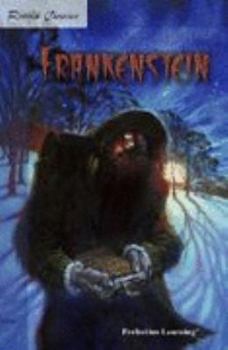Retold Classic Novel, Frankenstein
Select Format
Select Condition 
Book Overview
A scientist dreams of giving life to a fully grown creature but is terrified by his creation. This description may be from another edition of this product.
Format:Hardcover
Language:English
ISBN:1563122669
ISBN13:9781563122668
Release Date:January 2003
Publisher:Perfection Learning
Length:216 Pages
Weight:0.88 lbs.
Customer Reviews
1 rating
Gothic at its best
Published by Thriftbooks.com User , 16 years ago
Mary Shelley was the daughter of the famous feminist and author, Mary Wollstonecraft, who is best known for her work The Vindication of the Rights of Women. In Mary Shelley's Frankenstein, a young university student, Victor Frankenstein, obsesses with wanting to know the secret to life. He studies chemistry and natural philosophy with the goal of being able to create a human out of spare body parts. After months of constant work in his laboratory, Frankenstein attains his goal and brings his creation to life. Frankenstein is immediately overwrought by fear and remorse at the sight of his creation, a "monster." The next morning, he decides to destroy his creation but finds that the monster has escaped. The monster, unlike other humans, has no social preparation or education; thus, it is unequipped to take care of itself either physically or emotionally. The monster lives in the forest like an animal without knowledge of "self" or understanding of its surroundings. The monster happens upon a hut inhabited by a poor family and is able to find shelter in a shed adjacent to the hut. For several months, the monster starts to gain knowledge of human life by observing the daily life of the hut's inhabitants through a crack in the wall. The monster's education of language and letters begins when he listens to one of them learning the French language. During this period, the monster also learns of human society and comes to the realization that he is grotesque and alone in the world. Armed with his newfound ability to read, he reads three books that he found in a leather satchel in the woods. Goethe's Sorrows of Young Werther, Milton's Paradise Lost, and a volume of Plutarch's Lives. The monster, not knowing any better, read these books thinking them to be facts about human history. From Plutarch's works, he learns of humankind's virtues. However, it is Paradise Lost that has a most interesting effect on the monster's understanding of self. The monster at first identifies with Adam, "I was apparently united by no link to any other being in existence." The monster, armed only with his limited education, thought that he would introduce himself to the cottagers and depend on their virtue and benevolence; traits he believed from his readings that all humans possessed. However, soon after his first encounter with the cottagers, he is beaten and chased off because his ugliness frightens people. The monster is overwrought by a feeling of perplexity by this reaction, since he thought he would gain their trust and love, which he observed them generously give to each other on so many occasions. He receives further confirmation of how his ugliness repels people when, sometime later, he saves a young girl from drowning and the girl's father shoots at him because he is frightful to look at. The monster quickly realizes that the books really lied to him. He found no benevolence or virtue among humans, even from his creator. At every turn in his l





